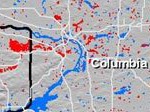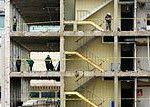Doctoral student shares experiences from Nobel laureates meeting
From June 29-July 4, University of Wisconsin–Madison nuclear engineering doctoral student Rachel Slaybaugh was among nearly 500 young researchers from around the world to attend the Lindau Meeting, a unique event in Lindau, Germany, that draws 25 Nobel laureates for lectures, panel and roundtable discussions, and social and networking events.
Morgridge Institute to hold symposium on integration of math, biology
To address the challenge and position UW–Madison scientists for the future, the Morgridge Institute for Research, part of the new Wisconsin Institutes for Discovery, has slated the first symposium on the Integration of the Mathematical and Biological Sciences, to be held Tuesday and Wednesday, Sept. 2-3.
Associate dean advises NASA on human challenges in space programs
A UW–Madison associate dean is part of a committee advising NASA on issues related to a new space program that will send human astronauts to Mars.
Scattered nature of Wisconsin’s woodlands could complicate forests’ response to climate change
If a warmer Wisconsin climate causes some northern tree species to disappear in the future, it's easy to imagine that southern species will just expand their range northward as soon as the conditions suit them.
Professor wins political science research prize
Assistant professor Susan Webb Yackee of the La Follette School of Public Affairs and the Department of Political Science at the University of Wisconsin–Madison has won the Paul Volcker Endowment Junior Scholar Research Grant from the American Political Science Association's Public Administration Section.
Support available in wake of Eagle Heights death
Support and resources are available to members of the UW–Madison community, particularly 2007-08 residents of Witte Hall, Susan B. Davis House, Eagle Heights and international students and scholars, in the wake of a recent student death.
Scientists see bright side of working with media
In a report published this week (July 11) in the journal Science, an international team of communications researchers reports that relationships between scientists and journalists are now more frequent and far smoother than the anecdotal horror stories scientists routinely share.
UW-Madison scanner program to benefit local retailers
The University of Wisconsin–Madison is partnering with a group of downtown businesses in a high-tech effort to combat underage drinking.
Flu-infected fly cells reveal dependencies of the virus
By giving fly cells the flu, scientists have identified scores of host genes the pathogen requires for successful infection, revealing a raft of potential new pressure points to thwart the virus.
A ‘red flag’ for expanding biofuels in the tropics
Biofuels, by recycling atmospheric carbon, are a potential boon to the world's ailing climate. But efforts in the tropics to significantly expand biofuel production by replacing tropical forests with oil palm, sugarcane and other agricultural biofuels could, in fact, accelerate climate change, according to a new study published this week (July 9).
Recent sightings: Peterson demolition
The Peterson Office Building is transformed into a cutaway skeletal shell as deconstruction crews continue dismantling panels of the structure on June 25,…
Learfield Sports makes major gifts to School of Journalism and Mass Communication
Learfield Sports has made major gifts to support technology and scholarships in the UW–Madison School of Journalism and Mass Communication.
Zero-gravity team finds spray cooling works in space
For the 10th consecutive year, University of Wisconsin–Madison students have found themselves floating upside down over the Gulf of Mexico.
Badger Insider Magazine features Badger comic artist
Mike Baron found his writing talent as a student at the University of Wisconsin–Madison, and more than 25 years later, his alma mater still inspires stories for his original comic. As described in the Summer 2008 edition of Badger Insider Magazine, themes from the UW–Madison campus and Wisconsin culture continue to influence "Badger," one of the successful comic series that Baron creates from his home base in Colorado.
Great Lakes Bioenergy Research Center hires scientific programs manager
The Great Lakes Bioenergy Research Center (GLBRC) has hired a translator to connect researchers who would normally live in entirely separate research worlds.
Wisconsin Day coming July 9 on the Big Ten Network
A wide range of university broadcast programming, from classic Wisconsin football to a spoken word student group, will be featured on Wednesday, July 9, during Wisconsin Day on the Big Ten Network (BTN).
BP presents solar-powered electric vehicle to Lakeshore Nature Preserve
BP America Inc., the largest oil and gas producer in the United States and one of the largest investors in alternative energy, is making a gift of a solar-powered all-terrain electric vehicle to the Lakeshore Nature Preserve at the University of Wisconsin–Madison.








